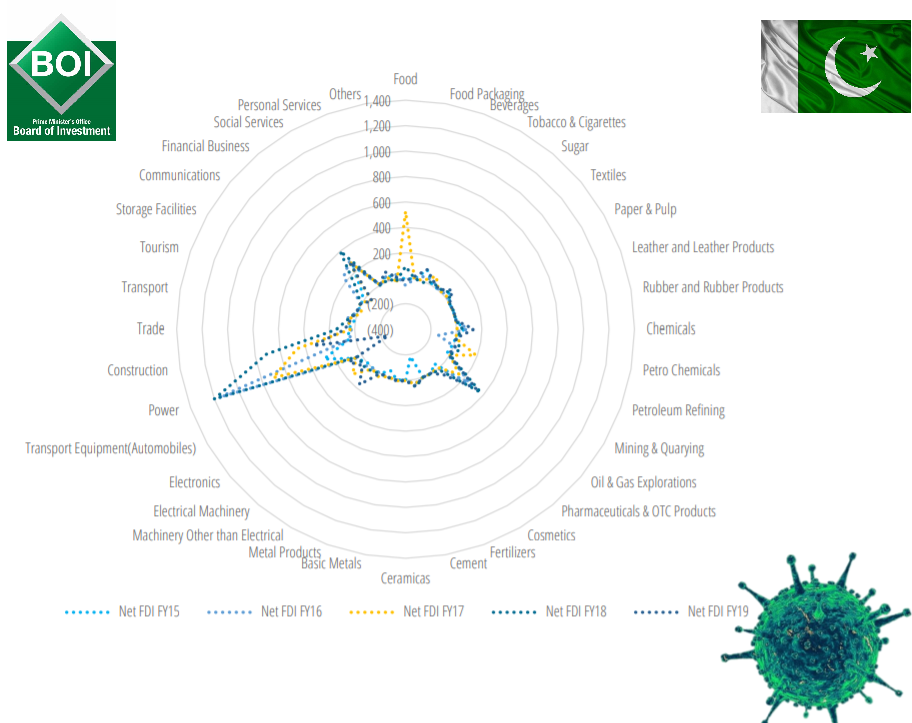The advent of year 2020, has put the whole world at a war against a pandemic, with a certainty of an uncertain future. With casualties ranging in hundreds of thousands and reported cases in millions, no country — from the most developed to the poorest — has been spared. The world is defining itself as pre-COVID-19 and post COVID-19, much as it does with pre-WWII and post-WWII. Over the second half of 2019, it was already becoming clear that the global economy was entering a recession, however the situation was expected to improve in 2020, led by the large emerging economies, with a return to potential global growth by 2021. However, with Covid-19 and its devastating effects, all bets are off, and all forecasts for 2020 being revised downward.
The Covid-19 virus can be expected to infect developing economies like Pakistan, through three transmission channels. Firstly, it will affect the aggregate demand, owing to the measures taken to contain the spread of the virus. Already witnessing a slowdown in the economy, the situation will worsen given the impending unemployment (rise to 8.1 percent, with 12.3 million to 18.53 million expected layoffs), as an aftermath of a lockdown. These layoffs will certainly decrease the disposable income of these households thereby sending a demand shock throughout the economy. This is then augmented by the expected decrease in the remittances, that is expected to take a hit of 10 to 50%, depending on the spread of the virus and the measures taken to contain it. These hits to the disposable income are expected to decrease the aggregate demand, with an expected fall in private consumption expenditure of 4 to 8 percent, thereby not only changing the economic outlook of the country but also changing the lifestyle of its masses.
The social and economic disruptions while threaten the reality as we know it, they also bring significant opportunities. In response, companies in multiple sectors are already transforming their products, processes, and business models. while FDI is expected to witness a major decline in Physical Tourism, Entertainment, Retail, Luxury goods, Aviation, Real estate, Coal, Oil & Gas, and Automotive due to the social restrictions, price wars, lock downs and shutdowns. However, there are growth opportunities that can be harnessed in food processing, consumer goods, logistics, entertainment & communications, financial services, eCommerce, EdTech, HealthTech, textile and tourism.
Pakistan needs an investment strategy response in order to reverse some of the Post COVID-19 distress on investment and trade. In the wake of the disruptions caused by Covid-19 and the new opportunities they provide, following 10-point agenda can act as a preliminary strategy response for attracting investment into Pakistan:
- Industrial Relocation under CPEC-IC to cater for non-Chinese companies as well;
- Incentivizing backward linkage-ing in SEZs;
- Fast tracking of CPEC Projects;
- 5G deployment be expedited to enable the industrial cooperation in technology;
- Building IT and security capacity;
- Revisiting priority sectors for investment;
- Diaspora investment certificates to solicit funds into quality projects;
- Incentivizing and facilitating industrial transformation;
- Devising an SME Survival plan; and,
- Providing due diligence for mergers & acquisitions.
While government has for the past several years focused on export-led growth; however, COVID-19 has exposed the vulnerability of betting only on trade and disregarding investment, with almost 4.64% expected loss in the GDP. The often separately considered topics of trade and investment must be thought about as one if Pakistan is to build the economy of the future.

Necessity is the mother of invention, and the response towards Covid-19 using the digital tools has not been short of an invention. The social and economic disruptions while threaten the reality as we know it, they also bring significant opportunities. In response, companies in multiple sectors are already transforming their products, processes, and business models.
The Covid-19 pandemic was confirmed to have reached Pakistan on 26 February 2020 when a student in Karachi tested positive upon returning from Iran.
The Government of Pakistan has announced a Rs1.2 trillion economic relief package to help support businesses in response to the Covid-19 outbreak. Of this, a total of Rs150 billion was allotted for low-income groups, particularly laborers while 280 billion rupees ($1.76 billion) was assigned for wheat procurement. Loan interest payments for exporters were deferred temporarily, while a package of 100 billion rupees ($63 million) was provided to support small industries and the agriculture sector. There was also a significant deduction in petroleum prices and the public pay electricity and gas bills below a certain amount in installments. These measures although well intended continue to have deliverable problems.
For further information consisting the selection of key measures taken by the Federal and Provincial Governments to help businesses deal with the economic fallout of the Coronavirus (COVID-19) outbreak, please visit :- https://www.coronavirus-legislation.com/home/pakistan

